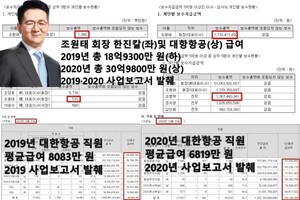
[시사포커스 / 강민 기자] Although the companies managed by Cho Won-tae and Hanjin Kal, chairman of Korean Air, drastically decreased their operating profit (consolidated basis) compared to 2019, I earned a salary of 3,098 million won from both companies.
According to the aviation industry and the Financial Supervisory Service on the 19th, Hanjin Kal recorded an operating loss of 221.1 billion won (consolidated basis) last year and Korean Air’s operating profit of 108.9 billion won (consolidated basis). Hanjin Kal increased its operating loss by 2172 billion won compared to 2019, and Korean Air’s operating profit fell 38.6% compared to 2019.
In this situation, Chairman Cho Won-tae said that the remuneration received from Hanjin Kal and Korean Air increased 38.7% compared to 2019. Chairman Cho received 1,366 billion won from Hanjin Kal and 1,734.41 million won from Korean Air, reaching a total of 3,098 million won. Chairman Won-tae Cho’s remuneration is an amount reflecting the return of executive salaries of 50% or more at the vice-president level or higher from April of last year. If 50% of monthly salary is not returned, the amount received will increase by more than 60% of the current amount.
Unlike the chairman’s salary, Korean Air’s employee salary fell 15.6%. According to a business report published by Korean Air, the average employee salary in 2019 was 8,830,000, while in 2019 it was found to be 68.19 million. Due to Corona 19, passenger sales have decreased, emergency management such as employee rotational leave and flight allowances have decreased, and employee salaries seem to have decreased.
An industry insider said, “Last year, Korean Air and other foreign exchanges continued, but Chairman Won-tae Cho took care of the stall. The Bank of Korea, which was unable to sell Asiana Airlines in the midst of the difficulties of brothers and sisters in the process, took a trick. He came and preoccupied the advantage of the three-party alliance, including Jo Hyun-ah. In particular, in terms of management, the rapid transition to freight transportation was very effective in the situation of Corona 19, so we succeeded in defending our performance. Demic situation has not eased, and the task of coping with the resumption of the passenger sector and the successful integration of Asiana Airlines remains.
